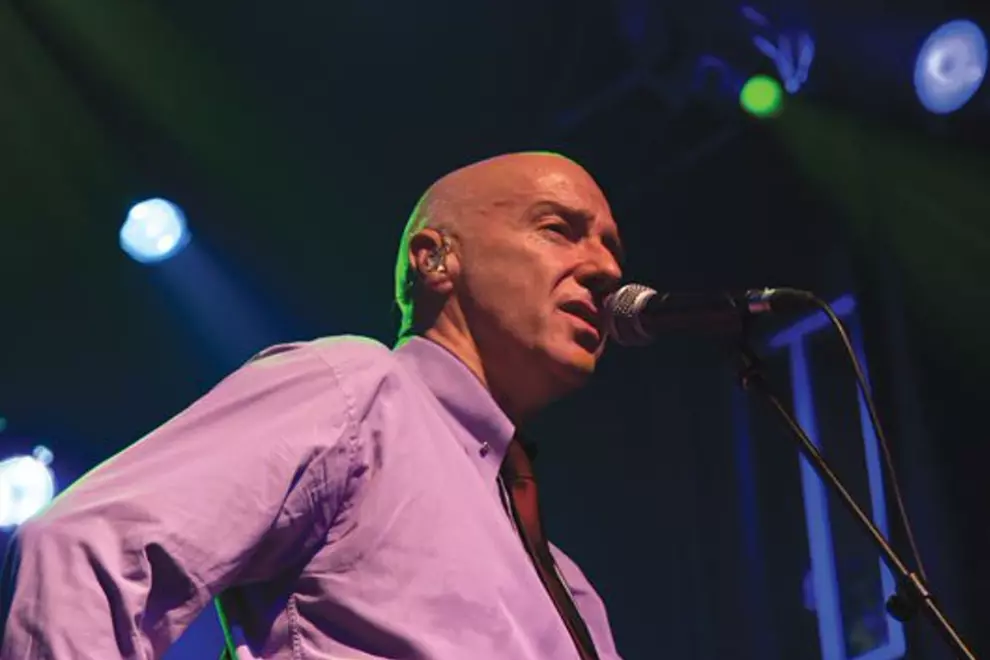Backstage at the El Rey Theatre on Wilshire Boulevard, Los Angeles, Midge Ure is unsure of the reception he'll get when he hits the stage to play a selection of solo and Ultravox tunes to a Californian audience. It's been 32 years since Vienna was released and 28 since Live Aid, the gargantuan charity event Ure and friend Bob Geldof created. Midge need not have worried; the audience, a mix of young goths and 40- and 50-something nostalgics lapped up his classic new wave pop later that night. However Ure is a realist and knows that while 500 payers adoring his music is admirable, ironically a few miles down the road at The Staples Centre, Muse, a band who “cut their teeth on what we did,” said Midge, was playing to almost 20,000 fans.
The reasons for the current Midge Ure American dates, and upcoming Australia tour in April, are twofold … A) reacquaint audiences with the music and have a bit of fun and B) see if there is scope for a full-scale Ultravox tour in the near future. Unfortunately, due to the corporate chaos that recently enveloped the band's label, EMI, the release of a new Ultravox album, Brilliant, last year virtually went unnoticed. Certainly it didn't get the promotional push it deserved. Ure now finds himself in a situation where to get things done, he has to do a lot of the promotional and logistical work himself. To make the American tour feasible, he's using the support band, LA's Right The Stars as his backing band.
“You have to leave your ego at the door and get on and drive the van,” Midge admits. “That's exactly what we have been doing. I looked at how we could possibly do this as a toe-in-the-water for possibly Ultravox coming back later in the year with the album. There is no record company to help you support the thing. You have to do it completely and utterly on your own. The only way you can do that is by using local musicians. My agent said we look after this band Right The Stars, they're LA-based and phenomenal musicians. So the only way to make this work is to do it with a local band, who are out promoting their own record; they've learned all my stuff. Five of us sit in this bus every day and drive forever and just do the thing. The bonus is that we all get on well, otherwise it could be hell.”
Much has obviously changed in the industry since Ultravox ruled the airwaves and Ure found modern record company logic difficult to fathom while recording Brilliant last year. “We'd started the album for Universal, who instigated the whole thing. During the recording process, it became very apparent they didn't really want an Ultravox album. They wanted an album with Ultravox's name on it and they wanted me singing on it, they didn't necessarily want what Ultravox did. They wanted a kind of watered-down version of what our hits were in the '80s. I went to a songwriting camp with the instigators whilst talking to them about this album, and the first thing they did was to announce to twenty-five writers there that they wanted songs written in an Ultravox style for Ultravox's new album. At which point, after they pulled me off the roof and got me down, I explained in no uncertain terms that this was never going to happen. It became very apparent we weren't talking about the same record at all. We found ourselves making a record with no record company. We decided to carry on writing and recording. We had nobody to deliver it to, so until something was in place… until EMI were given the green light… but they knew that this Universal thing was hanging over their heads and at some point they were going to be snapped up by them. What they (Universal) were trying to do was widen the demographic and make something that is a lot more palatable. They were trying to do an X Factor on somebody who has been doing what he does for a long time. It doesn't make sense and then they wonder why the industry is in the state that it is! It is like saying to Kate Bush, we love what you do but we have this girl over here who can write really good songs very similar to what you do. You know, we love Led Zeppelin but we don't want Robert Plant to sing on it, we've got this other guy. I don't get it!”
While record company business practices may have changed for the worse, developments in music technology have made the creative process easier for a tech-savvy band like Ultravox. “The last tour that Ultravox did we had twenty-five synthesisers on stage, which is ludicrous,” says Midge. “You had to do that if you needed a specific string sound, the old Yamaha SS30 string sound. That one keyboard made that one sound. You wanted a CS80 sound, you had to have a CS80. Same with the DX7, you had to have the specific thing. You couldn't replicate it back then and do all the keyboard split things that you can now. Now you can use a laptop with Mainstage and Logic and do keyboard splits, all the sounds that you want with all the effects on it, and all the level changes and things. It's so much easie but, carting around all of that stuff was a pain. Almost as painful was the early '80s, pre-MIDI when your Mini Moog couldn't talk to your drum machine. You had to have it altered and adapted to send the spike from the drum machine into the Mini Moog to make it go DDDDDD! So therefore you had to have two Mini Moogs and two drum machines, both adapted. And things would go wrong all the time. The drum machine in the middle of Vienna would just go quadruple-time. There was nothing you could do about it, just stop the song, reset and try again. The Mini Moogs went out of tune constantly, especially in hot clubs. The oscillators were constantly out. If you have seen any footage of Ultravox playing in the early days, a pair of headphones were constantly on the side of your head because you were tuning the oscillators between songs. We were prisoners to the basic technology we were using.”
For the solo tour, Midge is using Vintage brand guitars. They're Chinese-built but feature British electronics. Ure's model is a carbon copy of Fleetwood Mac founder Peter Green's old Les Paul standard, right down to the point of the bass humbucker pickup being reversed with the pickups on phase in the middle position. “They are stonkingly good guitars straight out of the box. The one I am using tonight was sent from Canada because they don't have a distribution deal in America. I took it straight out of the box, took all the plastic off, the sticky plastic off the pickups, plugged it in and kerrang, there it is.”
The production team at Vintage are currently working on a signature model for Ure, a Les Paul-style guitar with P90s but with the tailpiece of an SG standard. Ure is playing his guitar through a Vox 150 watt 1x12 combo. “This thing is amazing, a modelling amp with a valve front end so you get all the warmth and drive you would want but with the ability to pop patches anytime you like. Although once I get the sound I like, I don't like to change patches. I like the one sound.” Pedal-wise, Midge is keeping things fairly simple and for tonight's gig was using a Boss Blues Overdrive to compensate for the hire amp's lack of grunt.
Apart from Ure's musical success, he'll forever also be remembered as one of the instigators of the aforementioned Live Aid, the massive global concert event organised in 1985 to raise funds for relief for the ongoing famine in Ethiopia. “I'm still a Band Aid trustee,” Midge explains. “We're still there. When you're responsible for that kind of money... and the money still rolls in. Every time the record (Do They Know It's Christmas) is played on the radio, it generates income. The income has to be overseen and monitored and assessed on an annual basis. At some point in the not too distant future, we're going to have to decide who to pass the baton on to. That song will continue to generate money for the cause. So we have to decided who to pass the responsibility on to and who will make the future decisions.”
It took Ure a long time to understand and appreciate how important an historical event he and Geldof had created. “We were so embroiled in the middle of this huge thing that we created that we couldn't see the wood for the trees. We were right in the heart of it and it wasn't until many years later that the little girl next door come in and said we read about you in history today. It's in history books. People are talking about it now not just as a musical event, but a major social event. We used a medium that the majority of people understood. It wasn't a million miles away from what you normally do. You hear a piece of music, you buy a record and it makes a difference to someone thousands of miles away.”
The future of Ultravox is uncertain and basically comes down to economics. If there is demand, and a tour is commercially feasible, then the band will supply. “We'd love to tour America. We'd love to tour Australia,” Midge admits. “Part of the reason of me going to Australia with my band is the same reason I am doing it with a band here, to see if there is a taste for it... to see if there is a desire for Ultravox to get off our backsides and do it. The great thing is that three years ago, we wouldn't have been talking about Ultravox because it hadn't existed for twenty-eight years. Now we are talking about the future of Ultravox and the future is that the door is now open for Ultravox to do something.”
Ure was due to appear in Australia last year as part of the ill-fated Rewind '80s Music Festival. Australian fans can finally look forward to an energetic show from Ure when he tours in April with his UK-based band. Without giving too much away, the El Rey show consisted of a blend of tracks spanning Midge's entire career, including a couple of surprises and his vocal cords have lost none of the power associated with those epic '80 tunes. “In Australia, there's much more of a recognition factor,” he said of the upcoming tour. “It will be the combination of classic Ultravox things and what I would think are the more interesting solo things. Someone's been dangling a carrot in front of me to come down there for a long time. It almost looks like you're going and then it falls through, but this time I'm actually coming down to do something, which will be great.”
www.midgeure.com
Of Monsters And Men Announce 2026 Australian Tour


















